 Vampire Weekend's Surprising Jewish Stories
Vampire Weekend's Surprising Jewish Stories
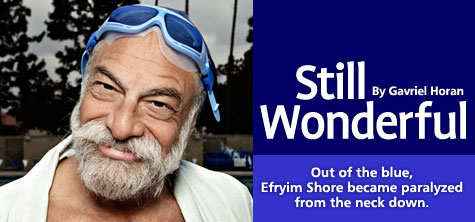

12 min read
Out of the blue, Efryim Shore became paralyzed from the neck down.
It was the second day of Rosh Hashana in 2004. Efryim Barry Shore came home from a full morning of prayers feeling a little tired. After a light lunch he decided to take a nap. Efryim climbed into bed, never knowing that it would be the last time he climbed into bed on his own for a long time.
He woke up feeling groggy, tried his best to get dressed and then collapsed into a chair, unable to move. His teenage son Ezra ran to shul to get a local doctor. “You don’t look too good,” the doctor said. Together, they managed to carry Efryim to a taxi and sent him off to the hospital. “Don’t worry – I’ll be home tomorrow,” he told his wife Naomi.
“In the morning I was standing. That night I was a total quadriplegic.”
As the day progressed, it became harder and harder for Efryim to move his body, until he was completely paralyzed from the neck down.
“In the morning I was standing in shul just like you,” he recalled. “That night I was in the hospital – a total quadriplegic.”
Guillain–Barré Syndrome
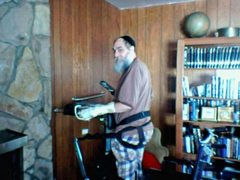 In a standing frame that helps
In a standing frame that helpsThe next thing he knew he woke up in a hospital bed with a woman doctor looking down at him. “Good morning Mr. Shore,” she said, introducing herself as a neurologist. “We believe that you have a very serious – possibly fatal – condition known as Guillain–Barré Syndrome (GBS). We’re going to administer some tests to confirm that.” He had never heard of Guillain–Barré Syndrome and wasn’t even sure how to pronounce it.
Guillain–Barré Syndrome, named after the two French doctors who identified it in 1916, is an autoimmune disease that causes the destruction, removal, or loss of the myelin sheath surrounding a nerve. This results in the rapidly progressive inflammation of nerves that causes loss of sensation, muscle weakness, and paralysis. The myelin sheath acts as an electrical insulator to nerve fibers. An average of 2 out of every 100,000 people is affected by Guillain–Barré each year.
GBS was confirmed after a spinal tap, delivered without anesthesia, showed a high level of protein in his spinal fluid. They administered Intravenous immunoglobulin (IVIG) to arrest the development of the condition, but they were uncertain if they could reverse the paralysis process.
Related Article: The Hero Within
Intensive Care
Efryim spent the next 11 days in the Intensive Care Unit. All he could move was his head from left to right. “To be in the ICU for so long was very intense – no pun intended,” Efryim recounts. “Every 20 minutes doctors and nurses came in to do tests. I was so well taken care of it is almost beyond comprehension.”
Efryim spent four and a half months in various hospitals, including ten days in a telemetry unit, followed by four months in rehabilitation hospitals.
“I was surrounded by so much love.”
“I was surrounded by so much love,” Efryim recounts. “My wonderful wife prepared healthy homemade kosher food for me every day. The hospital staff was bowled over by everything this woman did for me.”
After his release Efryim spent the next two years in a hospital bed in his home, three years in a wheelchair, one and a half years with full length braces and walker, finally graduating to the ankle braces and walking stick that he uses today. For seven months after the incident he couldn’t pick up a plastic fork. The first time he tried to feed himself, the food ended up on his forehead but today he is literally back on his feet.
The Power of Water
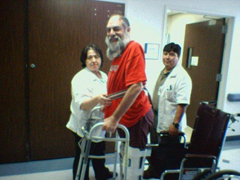 Taking my first steps.
Taking my first steps.His road to recovery was long and hard. Efryim attributes his success to what he calls P.T.L.: Prayer, Therapy, and Love – in that order. “The prayers of everyone in addition to my own brought down the spiritual power to make everything work out. Until today I meet people who tell me that they’ve been praying for me all these years. I am so thankful for their help. The physical therapy was necessary to get my body working again and the love gave me the strength to persevere. But the love has to go both ways – giving and receiving.”
Today he continues to undergo daily physical therapy but his greatest improvement came about unexpectedly. When he was getting wheeled home after his lengthy hospital stay, Efryim’s neighbor, Vince Newman, asked him with real concern what had happened. “I can help you walk again,” he said with confidence. Although they had waved good morning to each other for years, Efryim never knew that Vince was a leading expert on Aqua Therapy – physical therapy in the water. Using a special disability lane in a nearby pool, he was able to help people who were unable to walk to swim and through swimming eventually walk again.
He swims three miles at a time – six days a week.
At first Efryim could just float in the water using a plethora of floating devices that surrounded his body. But within six months he was able to move all his limbs in water. Before long he was able to swim a backstroke and within a year he was able to walk in the water. He continued swimming daily, all the while regaining his strength and in 2006, he amazed himself when he swam the equivalent of a full mile. It took him 96 minutes. The next year he challenged himself to swim two miles every day. Now it takes him 52 minutes to swim a mile and he swims three miles at a time without stopping – six days a week. This summer, he will be completing his 3000th mile. His lesson to others: “Never give up, persevere. There’s no end to what you can do—just keep doing it!”
Serial Entrepreneur
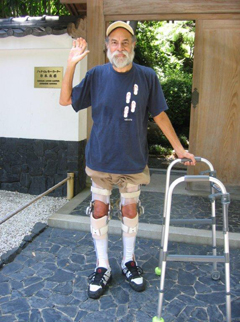 Hiking with my walker.
Hiking with my walker.In the midst of his remarkable recovery Efryim, who considers himself a “serial entrepreneur,” continued using his business skills. “I can’t move around very well but my mouth and mind seem to be working okay—I might as well use them.” He’s now on his fourth internet startup, this one titled, YouNeverLose.com, an innovative and fun auction site that offers a no risk opportunity to win prepaid/gift cards from top national brand names at huge discounts. Launched four months ago, it has already garnered CBS TV coverage, an AOL Finance article, a write up in Investor’s Business Daily and scores of other news and blog outlets. Directing a crew of 17 in several diverse locations including Israel, Efryim has the title of Founder and CVO: Chief Vision Officer. The website has already become profitable on an operational basis and he is out speaking with investors to raise more funding for what he believes can be a lucrative venture. Prior to this, Efryim’s notable ventures included a wholesale diamond business, an international calling service, and Fax4Free – bought out by eFax for over $10 million.
Keep Smiling
Throughout the long and arduous ordeal, Efryim somehow managed to stay positive. “This is where I am, this is what God wants from me. What can I do about it?” he asked rhetorically. “Why should I be angry? I’m alive. I’m talking.” His mother used to say that when people suffer they say “why me?” – accenting the “me” meaning, why do I have it so bad. She would encourage him to say it differently, with an accent on the “why”: “Why me?”- meaning why was I chosen to experience this and what can I learn from it?
”So I can’t do everything, but you do what you can, with what you have – and keep smiling!”
“But let’s be realistic,” Efryim says. “I’m still living it. I can’t run or jump, I need assistance 12 hours a day, I can’t get up the curb by myself, and I can’t walk up stairs without a banister. But I can be thankful for a banister when I find one or for the person who shows up at the right time to help me up the curb. So I can’t do everything, but you do what you can, with what you have, from where you are – and keep smiling!”
In fact, “Keep Smiling” has been Efryim’s motto for nearly two decades. Over 18 years ago, Efryim received a card in the mail from Rabbi Moshe Goldberger of the Yeshiva of Staten Island. The card said “Keep Smiling.” On the back was written the following:
A smile costs nothing, but gives much. It reaches those who receive without making poorer those who give. It takes but a moment, but the memory can sometimes last a lifetime.
None is so rich or mighty that he can get along without it and none is so poor but that he cannot be made richer by it.
A smile creates happiness in the home, fosters goodwill in business, and is the countersign of friendship. It brings rest to the weary, cheer to the discouraged. A smile is sunshine to the sad and is nature’s best antidote for trouble.
Yet it cannot be bought, begged, borrowed or stolen, for it is of no value to anyone until it is given away. Some people are too tired to give you a smile. Give them one of yours, as none needs a smile so much as he who has none to give.
Efryim immediately contacted Rabbi Goldberger and requested permission to reproduce it. He printed 1000 cards and gave them away to everyone he met. Since then he and his distribution network have given out over 250,000 cards. The goal is to reach a million. (Anyone interested in helping him meet this goal can order cards for free at www.thedailysmile.com.) Efryim has had the card translated into 17 languages, including Hebrew, Yiddish, and Farsi. Most recently, the card has been translated into Braille. “They can’t see smiles, but people can see their smiles,” Efryim explains. “If a blind person has what to smile for, it can inspire others to smile too. It’s the essence of Judaism! The great Rabbi Avigdor Miller zt”l once said that it’s better to have an insincere smile than a sincere frown. This is the Jewish way: become a giver and spread the message of hope to make sure the world is living with peace, happiness, love, and joy. It changes the whole world—literally.”
Life is Wondrous
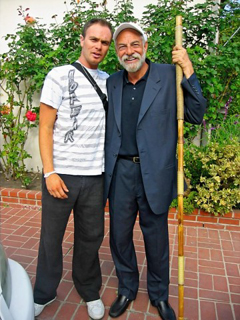 Efrayim with his son Ezra
Efrayim with his son EzraEfryim is still an avid hiker. He regularly walks along the trails of the Santa Monica Mountains with the help of his attendant, walking stick, and leg braces. Whenever he meets someone on the trail he asks them if they’re having a good day or a great day. “We’re gonna upgrade you,” he says before handing them a “Keep Smiling” card. He next asks them if they have someone they love, and then gives them another card to give to their loved one. Then he says “now that you’ve given, you can receive,” and gives them another card.
One time when Efryim gave a fellow hiker a card, his face lit up. “This is just what I needed,” he said. He went on to tell them about how bad his life was going. He had just lost a job and everything looked gloomy. Two days later, Efryim got a call from a rabbi who told him that that man told his story on National Public Radio to millions of listeners.
“Stories like that happen all the time,” Efrayim says. “There’s nothing artificial about it. Just be yourself. It’s a gentle reminder that life is wondrous.” He later helped Aish’s Rabbi Ephraim Shore make cards for the “Don’t Blame, Don’t Complain” campaign to hasten their son Yaakov’s recovery from a serious car accident. Although not related, the two now have more in common than their name alone.
“We live with the axiom that light is greater than darkness.”
“Complaining is not the Jewish way,” he says with a hearty laugh. “Believe me, I’ve had some things to possibly complain about in my own life, but we live with the axiom that light is greater than darkness. Start spreading the light and the darkness will disappear! Get it, love it, internalize it, live it!”
Positive Thinking
Efryim attributes his positive attitude to a conversation he had with his aunt at the age of seven. Efryim, originally from Boston, was looking out the window on a stormy New England day. It was cold and rainy and Efryim could think of many reasons to be upset. “What a horrible day,” he exclaimed. Just then his aunt came up behind him and chided him for seeing the negative. “What are you talking about?” she asked. “The rain and snow are so good for the world. It helps the plants to grow, it fills the river basins, and gives us water to drink. We can’t survive without rain!”
“That was a seminal moment in my life,” he recalls. “My eyes were different from then on. I realized that I had a choice whether to see the good in a situation, or to focus on the opposite. Sometimes in the midst of a very hot or rainy day you can find yourself beginning to grumble and complain. Stop yourself right before the negative words leave your mouth and say, ‘Thank God I’m alive; I’m walking; I can smile!’” Efryim’s signature on his email says www but it isn’t followed by a domain name. Instead he gives new definition to the acronym – “What a Wonderful World!”
As far as he’s concerned, it truly is.
